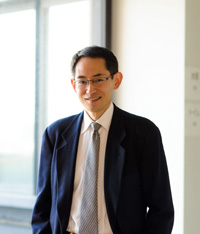May 22, 2015
Finding effective treatments for leukemia
Fumihiko Ishikawa, Group Director and Chief Scientist
Please describe your current research and its importance.
My laboratory researches blood cell production, immunity and leukemia in humans, with the goal of establishing effective therapies. We have used hematopoietic stem cells derived from humans to develop mouse models of blood cell production and immunity, which have enabled us to analyze how these systems develop and function. We have also succeeded in introducing human leukemia to immunodeficient mouse models, systems that provide vital information for overcoming the intractable cancer.
How did you become interested in the field?
I started my career as a clinical hematologist–oncologist, spending my days and nights caring for patients suffering from various blood diseases and cancers. Sadly, even with the best treatments available at the time, many of my patients succumbed to leukemia or other malignancies. I was torn between wanting to continue to support patients directly through, perhaps incomplete, therapies, and desiring to contribute to the discovery of more effective treatments for cancer. It was a tough decision, but I eventually decided to transition from clinical practice to research.
What has been your most exciting discovery?
Through cross-disciplinary collaboration, we identified a small molecule that targets kinases expressed in human leukemia stem cells. By introducing the compound to our mouse models of leukemia, we were able to almost completely eliminate the cells of a subtype of leukemia. We were very excited by the striking therapeutic effect and are currently working to develop the compound into a drug that can be used to treat patients.
What do you think has been the most interesting discovery in your field in recent years?
Genomic studies have demonstrated the presence of multiple mutations in leukemia patients. Some of these mutations seem to appear as people age, regardless of the type of disease they acquire. We are now trying to decipher the heterogeneity and complexity of leukemia by developing mouse models of patient-specific disease. At the same time, we are working with scientists who specialize in genomics, epigenetics and protein science to understand the link between molecular events and clinical outcomes.
What is the best thing about working at RIKEN?
The support we receive from those within and outside the institution. Our research would not have progressed without the cooperation of many scientists and laboratories, as well as administrative staff who help with hiring, contracts, patents and laboratory safety. We also benefit from direct interaction with specialists who develop advanced technologies such as flow cytometry, high-performance computing and next-generation sequencing to suit our research needs. Of course, we could not conduct our research without the help of clinical collaborators and patients who provide invaluable samples.
Please tell us about your professional goals.
My goal is to develop safe and effective therapeutics that help save the lives of leukemia patients. During my nine years at RIKEN, I have come closer to achieving this goal and will continue to strive to support patients who are awaiting effective treatments for complex diseases.

